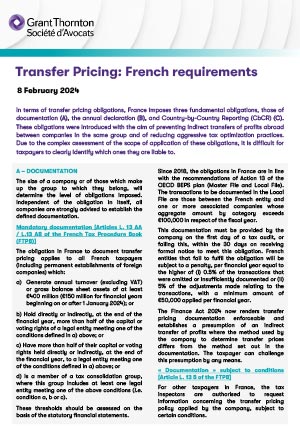-
Tax Policy Management
Tax Policy Management
-
Growth Management
Growth Management
-
Tax audit and litigation
Tax audit and litigation

-
Definition of a strategic and secure transfer pricing structure
Definition of a strategic and secure transfer pricing structure
-
Assistance in the development of international activities and operational reorganisations – “Business restructuring”
Assistance in the development of international activities and operational reorganisations – “Business restructuring”
-
Defense of practices and assistance in the context of tax audits and their follow-up from a litigation viewpoint
Defense of practices and assistance in the context of tax audits and their follow-up from a litigation viewpoint
-
Annual declaration and documentation obligations
Annual declaration and documentation obligations

-
Domestic and international VAT applicable to your company's flow
Domestic and international VAT applicable to your company's flow
-
Banking and financial VAT, VAT in the insurance sector
Banking and financial VAT, VAT in the insurance sector
-
VAT related to real estate registration fees
VAT related to real estate registration fees
-
VAT in the public and non-profit / association sector
VAT in the public and non-profit / association sector
-
Tax audit, tax litigation and relations with the Tax authorities
Tax audit, tax litigation and relations with the Tax authorities
-
Applicable rules for invoicing
Applicable rules for invoicing
-
Customs issues related to your company's international flows
Customs issues related to your company's international flows
-
French VAT registration and compliance obligations
French VAT registration and compliance obligations
-
Payroll tax
Payroll tax
-
Other indirect taxation
Other indirect taxation

-
Company transfer diagnosis
Company transfer diagnosis

-
Distribution strategy : Implementing and structuring
Distribution strategy : Implementing and structuring
-
Distribution activities digitalisation
Distribution activities digitalisation
-
Relations between suppliers and distributors
Relations between suppliers and distributors
-
Contractual policy : etablishing and structuring
Contractual policy : etablishing and structuring
-
Controls and litigation regarding payment terms
Controls and litigation regarding payment terms
-
Organising and securing commercial relations with consumers
Organising and securing commercial relations with consumers
-
Data protection - GDPR
Data protection - GDPR
-
Commercial Leases
Support in the management and contract management of commercial leases.

-
Traditional Services offered
Traditional Services offered
-
Health at work and quality of life at work
Health at work and quality of life at work
-
HR Management Audit
HR Management Audit
-
HR Engineering and People Change
Implementing managerial solutions in line with the company's strategic challenges
-
Management of HR compliance and internal investigations (harassment, discrimination, and whistleblowing)
Management of HR compliance and internal investigations (harassment, discrimination, and whistleblowing)

-
Advice on legal structuring
Advice on legal structuring
-
Day to day company management
Day to day company management
-
Companies reorganisation
Companies reorganisation
-
Mergers & Acquisitions - Private Equity
Mergers & Acquisitions - Private Equity
-
Changes in shareholder structure - Securities issue
Changes in shareholder structure - Securities issue
-
Governance and legal risks management
Governance and legal risks management

-
Development of an international mobility policy
Development of an international mobility policy
-
Coordination of reporting obligations for employees in a mobility situation
Coordination of reporting obligations for employees in a mobility situation
-
Advice on social security
Advice on social security
-
Assistance in labour law
Assistance in labour law

-
Management and protection of your portfolio of property rights
We put the most appropriate protection policy in place for our clients’ intellectual property rights.
-
Securing your projects: advisory and drafting of agreement services
We advise you on the feasibility of your project and the securing of your intellectual property and IT rights.
-
Enforcement of your rights: pre-litigation and litigation
Enforcement of your rights: detection of infringement, pre-litigation and litigation

In terms of transfer pricing obligations, France imposes three fundamental obligations, those of documentation (A), the annual declaration (B), and Country-by-Country Reporting (CbCR) (C). These obligations were introduced with the aim of preventing indirect transfers of profits abroad between companies in the same group and of reducing aggressive tax optimization practices. Due to the complex assessment of the scope of application of these obligations, it is difficult for taxpayers to clearly identify which ones they are liable to.
A – Documentation
The size of a company or of those which make up the group to which they belong, will determine the level of obligations imposed. Independent of the obligation in itself, all companies are strongly advised to establish the defined documentation.
Mandatory documentation [Articles L. 13 AA / L.13 AB of the French Tax Procedure Book (FTPB)]
The obligation in France to document transfer pricing applies to all French taxpayers (including permanent establishments of foreign companies) which:
- Generate annual turnover (excluding VAT) or gross balance sheet assets of at least €400 million (€150 million for financial years beginning on or after 1 January 2024); or
- Hold directly or indirectly, at the end of the financial year, more than half of the capital or voting rights of a legal entity meeting one of the conditions defined in a) above; or
- Have more than half of their capital or voting rights held directly or indirectly, at the end of the financial year, to a legal entity meeting one of the conditions defined in a) above; or
- Is a member of a tax consolidation group, where this group includes at least one legal entity meeting one of the above conditions (e. condition a, b or c).
These thresholds should be assessed on the basis of the statutory financial statements.
Since 2018, the obligations in France are in line with the recommendations of Action 13 of the OECD BEPS plan (Master File and Local File). The transactions to be documented in the Local File are those between the French entity and one or more associated companies whose aggregate amount by category exceeds €100,000 in respect of the fiscal year.
This documentation must be provided by the company on the first day of a tax audit, or failing this, within the 30 days on receiving formal notice to meet this obligation. French entities that fail to fulfil the obligation will be subject to a penalty, per financial year equal to the higher of (i) 0.5% of the transactions that were omitted or insufficiently documented or (ii) 5% of the adjustments made relating to the transactions, with a minimum amount of €50,000 applied per financial year.
The Finance Act 2024 now renders transfer pricing documentation enforceable and establishes a presumption of an indirect transfer of profits where the method used by the company to determine transfer prices differs from the method set out in the documentation. The taxpayer can challenge this presumption by any means.
« Documentation » subject to conditions [Article L. 13 B of the FTPB]
For other taxpayers in France, the tax inspectors are authorised to request information concerning the transfer pricing policy applied by the company, subject to certain conditions.
In effect, this entails the provision of simplified documentation within a period of 60 to 90 days. Failure to comply with the request will result in a fine of €10,000 for each fiscal year covered by the request. In addition, the French tax authorities are authorised to reassess the taxable income on the basis of the information available to them.
B – ANNUAL DECLARATION
Article 223 quinquies B of the French General Tax Code (FGTC) provides for the obligation to declare transfer prices.
This declaration (Cerfa form 2257-SD) must be filed electronically each year by certain French taxpayers and within six months of the filing of their tax return. This obligation applies to French taxpayers whose turnover or total gross assets are equal to or greater than €50 million, as well as to those who hold a subsidiary or who are held by direct or indirect shareholders (holding of capital or voting rights equal to or greater than 50%) reaching these same thresholds. These thresholds must also be assessed on a statutory basis.
The declaration should include more particularly, a description of the transfer pricing methods used, information relating to the operations and location of the major intangible assets, as well as the amounts of cross-border intra-group transactions recorded in the statutory accounts together with the jurisdiction in which the relevant counterparty is established.
Failure to file the declaration, as well as any omissions and inaccuracies, are subject to the following penalties:
- A fine of €150 if the declaration is not filed within the prescribed time limit;
- A fine of €15 per omission or inaccuracy, except in the event of a force majeur,
the total amount of said penalties may not be less than €60 or more than €10,000.
These penalties are not applicable in the event of a first offence committed during the current calendar year or in the three preceding calendar years, where the taxpayer has remedied the failure to comply either spontaneously or within 30 days of a formal request from the French tax authorities.
C – COUNTRY BY COUNTRY REPORTING
The Country-by-Country Reporting ("CbCR") obligation is defined in Article 223 quinquies C of the French General Tax Code.
Within 12 months of the fiscal year-end, French companies must declare their activities, as well as their profits on a country-by-country basis together with a number of economic, accounting and tax aggregates (Cerfa form 2258-SD).
French companies subject to this obligation are those which:
- Establish consolidated accounts; and
- hold or control, directly or indirectly, one or more legal entities established outside France or that have branches abroad;
- Have consolidated annual sales of at least 750 million euros; and
- not held by one or more legal entities located in France subject to this country-by-country reporting requirement or located outside France and subject to a similar reporting requirement under foreign law.
Companies that fail to comply with this obligation are liable to a penalty up to €100,000.
In addition, under certain conditions, French taxpayers may be subject to a notification requirement in their corporate income tax return (form 2065-SD).
This declaration should not be confused with the public CbCR applicable in France for the financial years beginning on or after 22 June 2024, the content of which is comparable to the CbCR (2258-SD). The statutory auditors will be required to state whether the company is subject to this public CbCR and, if this is the case, certify that the relevant report has been published and made available to the public for the financial year preceding that for which the accounts are certified.














